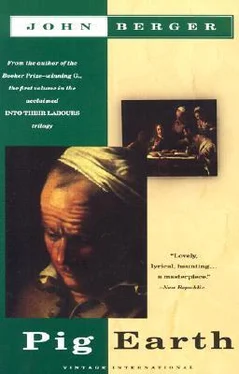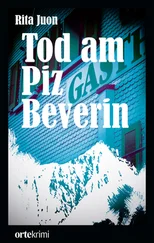I first singled you out at school, said the Cocadrille, you made less noise than the other boys and you were methodical. You always carried a knife in your hands, always carving a stick. Once you cut yourself, and I saw you peeing over your cut to disinfect it.
Amongst the flowers in the grass there were red campions. Their pink is like the pink of paper flags all over the world when there is a fiesta.
Where are we?
This is where I am going to build.
Who does it belong to?
Me.
You!
The dead own everything, she said.
So you have land now.
Land but no seasons.
How do you plant?
We don’t, we have no reason to, we have access to all the granaries in the world, they are all full.
And when they are empty?
They are full for ever.
Why don’t you give potatoes to the hungry then?
We can’t.
You could smuggle some across.
I chose a smoked ham for you last winter, it weighed seven kilos and was beautifully dry, I stood by when it was being smoked for two days, I was there when Emile cut the juniper bushes and when he threw water on the burning branches to make more smoke, six weeks earlier I led the pig to have her throat cut, I put my hands over her eyes so she became calm when the life flowed out of her, I gave her to the sow to suckle the day she was born, and I carried the ham to your house and I hung it in the cellar, wrapped in muslin, and when you found it two days later it was a bone, even the string had rotted and you found it in the earth in which you bury your white beet so they stay white on the cellar floor.
That bone! I muttered.
And you said: It could be the ham of a pig we killed when I was a child. I heard you say that and I knew then I could give you nothing.
You are lying.
You didn’t say that and you didn’t throw it over the wall?
Yes I did.
She shrugged her shoulders.
The figures I had seen from afar were working on timber, hammering nails into the joints of three vast frames which lay flat on the ground and which, when raised, would hold the walls and roof of a chalet. Each frame had five vertical columns, each column as thick as a sixty-year-old tree and twelve metres high.
They felled the trees last September, the Cocadrille said, on the day I was killed with the axe. The sap was rising.
The frames laid out on the ground were the colour of stripped radiant pine. One of the men who was hammering straightened his back. It was Marius Cabrol. I had seen him last on his deathbed. I had made the sign of the cross with a sprig of boxwood dipped in holy water over his heart. It was his daughter who had laid him out and dressed him. The way he now greeted us disconcerted me for he gave no sign that he remembered or recognised any of this. He grinned as if we had just drunk a glass together.
Fifteen spruces for the columns, he said, a dozen for the purlins, forty twenty-year-old trees for the rafters, I forget how many for the planks. We cut them all down when the axe entered her head. She told us afterwards she heard us sawing in the forest.
The first thing I did, wasn’t it, was to bring you all cider and cheese and bread. I knew exactly where you were.
We were getting hungry, said Marius, smiling.
She took my hand and we stepped over the columns of the nearest frame. She was a young woman leading an old man. The men sat astride the frame as they hammered, the nails were big and they launched them into the wood with blows from the shoulder.
All right, Lucie? The hammerer who shouted this with virile impertinence was Armand who had been carried away by the Jalent and drowned. Next to him hammered Gustave who had fallen from the mountain. Georges, who hanged himself because he knew that he would become a pauper, was sewing paper flowers to the branches of a tiny spruce; the flowers were white like silver and yellow like gold. Adelin, who was killed by a tree in the forest, was tying a rope. Mathieu who was struck dead by lightning was measuring with a yellow ruler. Then I recognised Michel who died of internal bleeding after being kicked by a horse, and I saw Joset who was lost in an avalanche.
Why are they all here? I demanded.
They have come to help us, each of them brought food and drink for the meal tonight, they are good neighbours.
Why only—
Only what, Jean?
The ones who died violently.
They are the first you see.
And those who died peacefully?
There are not so many who die in their beds. It’s a poor country.
Why first—? My fears that I had been led into a trap were increased.
Bend down.
She kissed me on the cheek and my fears became ridiculous. Her mouth was full of white teeth and she smelt of grass. Was it really she who fifty years ago nobody in their right mind would have thought of marrying?
They all say your trouble was that you were fearless.
I knew what I wanted.
She laughed. Between the buttons of her shirt I could make out the slight, barely noticeable rise of her breasts. Like two leaves on the earth.
Do you know, it took me no longer to learn my way around here among the dead than it took me to learn my way around the city of B.…
As she said this, her voice aged and became hoarser. I glanced at her. She was an old woman with a sack on her back and she looked mad.
Who is going to live in the chalet?
Somebody from behind pushed my beret over my eyes. It was Marius, her father. Once again he was grinning.
You are warmer in bed with a wife. The whole war I thought of nothing else, I thought only of caressing Mélanie in bed. The way Marius spoke had the unctuousness of a caress. There were some who had intercourse with donkeys, it never interested me, a beast isn’t soft enough, when at last I came home I took her to bed and we had our fourth child. Even when I was old and lost my warmth, I thought of going to bed when I was working alone in the fields, sometimes thinking about it made me warm. There are those who call me lazy. It was my idea of happiness, you’ll see for yourself, if you don’t see now — it’s better than sleeping alone.
The Cocadrille walked away, across her back was tied the blue umbrella and over her shoulder she carried a sack.
Aren’t you forgetting that your daughter has been a spinster all her life? I asked.
Ah! my poor Jean, my poor future son-in-law, it’s now that she’s at the marrying age. Why else would I be building a chalet for her?
You were never a carpenter, I pointed out, and sixty-eight is no marrying age!
We can become anything. That is why injustice is impossible here. There may be the accident of birth, there is no accident of death. Nothing forces us to remain what we were. The Cocadrille could be seventeen, tall, with wide hips and with breasts you couldn’t take your eyes off — only then you wouldn’t know her, would you?
Once more I had the feeling of not yet having entered the forest, of all my life being in front of me.
All the men you see working here, whispered Marius — I remembered the milk running off her breasts — have married her!
Not Georges! I exclaimed.
Georges was the first. He married her the day after her funeral. The bridesmaids took the flowers from the grave. Those who die violently fall into each other’s arms.
Am I to die violently? I asked.
Do you want to marry her? His smile had now become a leer.
Everything’s ready! a man shouted.
The frame lay on the ground, constructed, finished, waiting to be lifted up into the air. To lift such a frame, thirty-five or forty men are needed. They came from every direction. All those whom I recognised were among the dead. Some carried ladders. Some were speaking and joking to one another and I could not hear their words. All of them greeted Marius à Brine who stood beside the sablière, which is the horizontal timber on the ground into which the frame, when vertical, has to be fitted. He who was no carpenter had become the master builder.
Читать дальше












